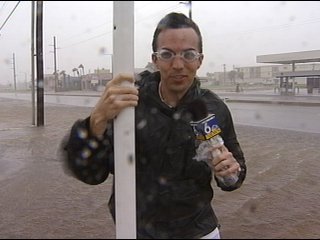Celebrate the holiday season with Mizzou's journalism organizations
The holiday season has arrived, and that means it's time for MU's journalism students to celebrate. Join the Online News Association and the school's other journalism organizations for a mixer on Thursday, Dec. 6, at 5 p.m in the Neff Hall Student Lounge. There will be dessert (lots of it) and conversation for all, but only one group will walk away as the champion of the trivia contest. All journalism students are invited to the mixer, which will be a great opportunity to learn how to get involved in MU's journalism organizations.
Three Missouri School of Journalism professors' blogs you should be reading
By Andrew Gibson
There's a good chance you've blogged about something during your time at the Missouri School of Journalism. It might've been for Journalism 2150 -- a required course, for those not familiar -- or maybe you're like us and write for a school organization.
What you might not have known, though, is that some of the professors grading your blogs might have ones of their own. Here's a look at three MU faculty members who, as they advise you to do, are building their online brand.
Twitter: (@mayerjoy)
The Columbia Missourian's director of community outreach writes about, you guessed it, the intersection of journalism and community. You'll find posts about being transparent with your audience and about "what Missouri community newspapers are doing on Facebook."
But here's the bonus: Mayer, also an associate professor in Print and Digital News, teaches participatory journalism (Journalism 4700), which is all about "social media, analytics, identifying audience, being ambassadors for the newsroom, crowdsourcing and comment moderation." That means her blog is full of useful snippets from the course. If you're curious how to market yourself, find a job or avoid becoming the annoying one in the newsroom, start reading.
There's a good chance you've blogged about something during your time at the Missouri School of Journalism. It might've been for Journalism 2150 -- a required course, for those not familiar -- or maybe you're like us and write for a school organization.
What you might not have known, though, is that some of the professors grading your blogs might have ones of their own. Here's a look at three MU faculty members who, as they advise you to do, are building their online brand.
Joy Mayer
Twitter: (@mayerjoy)
The Columbia Missourian's director of community outreach writes about, you guessed it, the intersection of journalism and community. You'll find posts about being transparent with your audience and about "what Missouri community newspapers are doing on Facebook."But here's the bonus: Mayer, also an associate professor in Print and Digital News, teaches participatory journalism (Journalism 4700), which is all about "social media, analytics, identifying audience, being ambassadors for the newsroom, crowdsourcing and comment moderation." That means her blog is full of useful snippets from the course. If you're curious how to market yourself, find a job or avoid becoming the annoying one in the newsroom, start reading.
Letters Home: Bart Bedsole
 |
| Bart Bedsole is an anchor for KZTV in Corpus Christi, Texas. He graduated from the Missouri School of Journalism in 2000 with a degree in broadcast journalism. |
DEAR MYSELF AT AGE 20...
Be very thankful. You are among the final generations of young broadcast news reporters that will graduate to find a job that provides a decent salary and a photographer to work with. Ten years from now, people hired for the same position will be required to shoot their own stories, as well as post it all online in more places than you can imagine, and you will do it all for less money.
Don't rush to move on to higher markets or positions, because happiness and success can be found anywhere.
Spend more time on your writing and less building your resume tape. Your coworkers will respect you more for it.
LIVE BLOG: Get feedback on your online portfolio!
5:40 p.m. - Reuben Stern from RJI says if you have different interests, make sure it's clear you're passionate about each one. Don't make it seem like you're only "willing" to do something. Stern also says it's important to put more emphasis on your work than the places you worked.
5:30 p.m. - MU photojournalism student Colleen DeAnna shows her portfolio website on WordPress. She has photos she's taken for the Missourian, Vox and portrait photography. She also includes her resume as a downloadable PDF. Weir says having a downloadable resume is a good idea because, when hiring, he prefers to print out resumes as a reminder to review them. You should also condense a web portfolio for your best work. Employers want to see what you are capable of.
5:25 p.m. - MU Convergence grad student Charles Minshew shows his portfolio website. He says professionals have told him web developers should work on coding their own sites. He also links to a WordPress blog on his site.
5:15 p.m. - Nathan Byrne from Newsy.com says your website should be simple so no one viewing it "gets lost." You don't want to oversell yourself. Byrne also says you should show off daily work on your portfolio site. You want potential employers to know you do good work on a regular basis.
5:10 p.m. - Weir shows websites from MU grads like Juana Summers and Kristin Kellog as examples. You should also buy a domain name and host space. Developers like Weebly and WordPress allow you to purchase domain names through them. Squarespace.com also lets you create sites by "dragging and dropping" elements.
5:05 p.m. - MU Multimedia Planning and Design Professor Rob Weir says WordPress is clean, fine easy to read for people who don't want to be online developers.
5:30 p.m. - MU photojournalism student Colleen DeAnna shows her portfolio website on WordPress. She has photos she's taken for the Missourian, Vox and portrait photography. She also includes her resume as a downloadable PDF. Weir says having a downloadable resume is a good idea because, when hiring, he prefers to print out resumes as a reminder to review them. You should also condense a web portfolio for your best work. Employers want to see what you are capable of.
5:25 p.m. - MU Convergence grad student Charles Minshew shows his portfolio website. He says professionals have told him web developers should work on coding their own sites. He also links to a WordPress blog on his site.
5:15 p.m. - Nathan Byrne from Newsy.com says your website should be simple so no one viewing it "gets lost." You don't want to oversell yourself. Byrne also says you should show off daily work on your portfolio site. You want potential employers to know you do good work on a regular basis.
5:10 p.m. - Weir shows websites from MU grads like Juana Summers and Kristin Kellog as examples. You should also buy a domain name and host space. Developers like Weebly and WordPress allow you to purchase domain names through them. Squarespace.com also lets you create sites by "dragging and dropping" elements.
5:05 p.m. - MU Multimedia Planning and Design Professor Rob Weir says WordPress is clean, fine easy to read for people who don't want to be online developers.
EVENT ALERT: Get feedback on your portfolio
 Want
to build or revamp your portfolio website before submitting your
internship or job applications? Many summer application deadlines are coming up, so join ONA Mizzou at 5 p.m. on Nov. 8 in
42 Walter Williams for expert advice on
how to make your site attractive to employers.
Want
to build or revamp your portfolio website before submitting your
internship or job applications? Many summer application deadlines are coming up, so join ONA Mizzou at 5 p.m. on Nov. 8 in
42 Walter Williams for expert advice on
how to make your site attractive to employers.Whether you're using templates like WordPress or coding your own site, we'll have experts from Newsy and the Missourian on hand to help you through every phase of the process. Bring your link if you want on-site feedback.
Journalists partially to blame for false Hurricane Sandy tweets
By Erin Dismeier
It's hard not to love Twitter. It's useful to journalists trying to push out the most up-to-date information, and it gains special importance during disasters like Hurricane Sandy, which hit the East Coast last week. Although the real-time social media platform has its upsides, rumors spreading 140 characters at a time became a big problem during the storm.
Many were outraged by the account ComfortablySmug, which tweeted false information about Sandy. BuzzFeed learned the person behind the handle was Shashank Tripathi and deemed him "Hurricane Sandy's worst Twitter villain." Two of the biggest falsehoods Tripathi spread were about a citywide blackout in Manhattan and the floor of the New York Stock Exchange flooding. Some of his tweets were retweed more than 500 times.
Tripathi did send out a formal apology to New Yorkers and admitted to spreading the false information. But looking closer at what happened, it's worth asking: Are journalists somewhat to blame?
It's hard not to love Twitter. It's useful to journalists trying to push out the most up-to-date information, and it gains special importance during disasters like Hurricane Sandy, which hit the East Coast last week. Although the real-time social media platform has its upsides, rumors spreading 140 characters at a time became a big problem during the storm.
Many were outraged by the account ComfortablySmug, which tweeted false information about Sandy. BuzzFeed learned the person behind the handle was Shashank Tripathi and deemed him "Hurricane Sandy's worst Twitter villain." Two of the biggest falsehoods Tripathi spread were about a citywide blackout in Manhattan and the floor of the New York Stock Exchange flooding. Some of his tweets were retweed more than 500 times.
Tripathi did send out a formal apology to New Yorkers and admitted to spreading the false information. But looking closer at what happened, it's worth asking: Are journalists somewhat to blame?
Subscribe to:
Comments (Atom)



